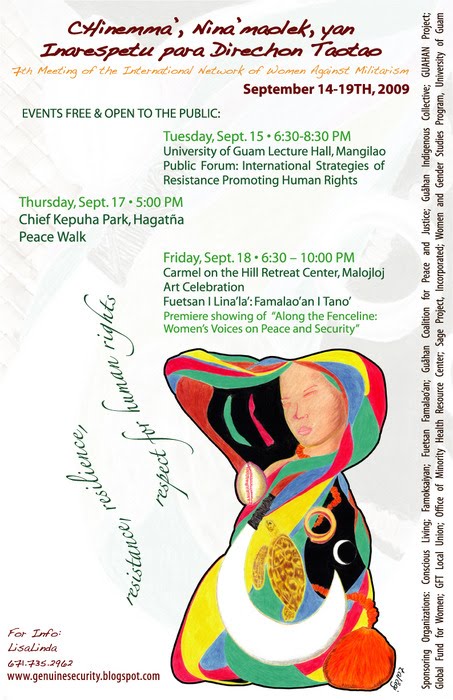Message from the International Women’s Network Against Militarism to the peoples movement for No Naval Base on Jeju!
September 1, 2011
Dear friends in the struggle against US military expansion at Jeju Island
We women from Okinawa, mainland Japan, the Philippines, Marshall Islands, Guam, Hawaii, Puerto Rico, Australia and west-coast USA send our greetings in solidarity with the people of Ganjeong who oppose the construction of a new naval base to house Aegis destroyers.
We understand that 94 percent of the residents do not want this base. We admire and respect your strong opposition by occupying land seized by the government and by blocking roads in an attempt to stop construction. We deplore the fact the South Korean government has ordered police to take further measures against you, especially as you have used every possible democratic means to overturn the decision to construct the base in the pristine waters and land that have been your livelihood for many generations.
We agree that this base and the increased militarization of the island of Jeju will create new security threats in an increasingly tense region.
We also live in communities that experience increased militarization and the effects of enormous military investments that distort our local economies and take resources needed for our communities to thrive. The political and military alliances between our governments and the United States jeopardize our genuine security. Indeed, U.S. military expansion in the Asia-Pacific and the Caribbean relies on these alliances to tie our communities together according to their version of security that is not sustainable.
The plan to relocate U.S. Marines from Okinawa to Guam includes military construction projects that involve labor from Hawai’i, Micronesia and the Philippines. In addition to the destruction and loss of life caused by continued wars in the Middle East, these wars are also destabilizing our economies. For example, Filipinos who have been recruited to work on military construction projects are laid off during times of crisis and return to the Philippines where they have no jobs. On Guam, local companies cannot compete with larger military contractors and are seldom able to get contracts for base construction projects. The establishment of the U.S. military base at Ke Awa Lau o Pu’uloa, or Pearl Harbor, has transformed Oahu’s food basket into a toxic “Superfund” site where many of Hawai’i’s poorest communities live along its contaminated shores. In Puerto Rico, Governor Luis Fortuño has unleashed brutality against citizens, and suppression of their civil liberties because of protests against budget cuts to public services and education. In the continental United States a new campaign is calling for new priorities in federal spending away from war and toward services to support local communities.
We see your struggle as part of a wider pattern of people’s protest against increasing militarization.
Although we are far away, please know that we stand with you. We thank you for your courage to resist the militarization of your home. Your example inspires and strengthens us.
In solidarity,
Signed, on behalf of the IWNAM:
Kozue Akibayashi, Women’s International League for Peace and Freedom, Japan
Ellen-Rae Cachola, Women for Genuine Security/Women’s Voices Women Speak, U.S. & Hawai’i
Lotlot de la Cruz, KAISAKA, Philippines
Cora Valdez Fabros, Scrap VFA Movement & Philippine Women’s Network for Peace and Security, Philippines
Annie Fukushima, Women for Genuine Security, U.S.
Terri Keko’olani, Women’s Voices Women Speak, Hawai’i
Gwyn Kirk, Women for Genuine Security, U.S.
Rev. Deborah Lee, Women for Genuine Security, U.S.
Bernadette “Gigi” Miranda, Women’s Voices Women Speak, Hawai’i
María Reinat Pumarejo, Colectivo Ilé: Organizadoras para la Conciencia-en-Acción
Aida Santos-Maranan, Women’s Education, Development, Productivity and Research Organization (WEDPRO), Philippines
Dr. Hannah Middleton, Australian Anti-Bases Campaign Coalition, Australia
Suzuyo Takazato, Okinawa Women Act Against Military Violence, Okinawa
Lisa Natividad, Guahan Coalition for Peace and Justice, Guahan (Guam)
Ana Maria R. Nemenzo, WomanHealth Philippines.
Darlene Rodrigues, Women’s Voices Women Speak, Hawai’i
Abacca Anjain-Maddison, Marshall Islands
Brenda Kwon, Women’s Voices Women Speak, Hawai’i
Anjali Puri, Women’s Voices Women Speak, Hawai’i
The International Women’s Network Against Militarism was formed in 1997 when forty women activists, policy-makers, teachers, and students from South Korea, Okinawa, mainland Japan, the Philippines and the continental United States gathered in Okinawa to strategize together about the negative effects of the US military in each of our countries. In 2000, women from Puerto Rico who opposed the US Navy bombing training on the island of Vieques also joined; followed in 2004 by women from Hawai’i and in 2007 women from Guam. The Network is not a membership organization, but a collaboration among women active in our own communities, who share a common mission to demilitarize their lands and communities. For more information, visit HYPERLINK “http://www.genuinesecurity.org/”www.genuinesecurity.org.









